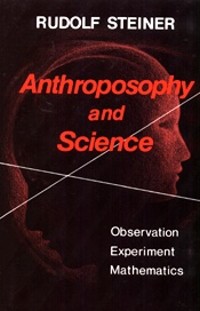![[Steiner e.Lib Icon]](https://wn.rudolfsteinerelib.org/icons/pix/rsa_icon2.gif)
|

|
|
Rudolf Steiner e.Lib
|
|
|
Anthroposophy and Science
Rudolf Steiner e.Lib Document

|
|
|
Anthroposophy and Science
Observation, Experiment, Mathematics
On-line since: 31st July, 2009
Anthroposophy and Science
Rudolf Steiner e.Lib Document
Lectures Section
Rudolf Steiner examines the underlying precepts of the modern
scientific approach and its current tools of observation of
nature, experimentation, and the use of mathematics to establish
quantitative relationships which are then framed as laws. He
relates the validity of this approach for examination of the
lifeless mineral realm and then describes the different cognitive
states that are necessary to scientifically examine the realms
of the living and of the conscious.
By Rudolf Steiner
Translated Walter Stuber and Mark Gardner
Edited by Gladys Hahn and Gerald Karnow, M.D.
Bn 324, GA 324, CW 324
Rudolf Steiner examines the underlying precepts of the modern
scientific approach and its current tools of observation of
nature, experimentation, and the use of mathematics to establish
quantitative relationships which are then framed as laws. He
relates the validity of this approach for examination of the
lifeless mineral realm and then describes the different cognitive
states that are necessary to scientifically examine the realms
of the living and of the conscious.
Anthroposophy and Science was publish in German as,
Naturbeobachtung, Experiment, Mathematik und die Erkenntnisstuffen
der Geistesforschung.
This translation was done by Walter Stuber and Mark Gardner, and
was edited by Gladys Hahn and Gerald Karnow, M.D. The cover was
designed by Maryann Perlman. We present this document here with
the kind permission of the Rudolf Steiner-Nachlassverwaltung,
Dornach, Switzerland.
From Bn 324, GA 324, CW 324.
Copyright © 1991
This e.Text edition is provided through the wonderful work of:
The Mercury Press
|

Some editions and/or translations of this book are available for purchase from:
search
for related titles available for purchase at
Amazon.com!
Find more information at
Google Book Search.
|
Thanks to an anonymous donation, this lecture has been made available.
| | Cover Sheet |
|
| Contents |
|
| Introduction by Georg Unger |
|
| |
| Lecture I |
March 16, 1921 |
|
The
three forms of science. Observation of nature, experiment and
mathematical penetration of nature. The nature of the
experiment. The certainty of mathematical knowledge. Psychology
then and now. Growth in boys and girls. The customary cognition of
nature. The philosophy of David Hume. Mathematical cognition as an
inner constructive activity. Spiritual cognition as an inner activity
encompassing reality.
|
|
| Lecture II |
March 17, 1921 |
|
The
membering of man into
nerve-sense system, rhythmical system of feeling and
metabolic-will system as described in the book Riddles of the
Soul. The inner nature of vision, arm-movement and walking in
relation to the three dimensions of space.
|
|
| Lecture III |
March 18, 1921 |
|
The
possibility of explaining nature out of itself and the super-sensible
world. Normal and mathematical nature knowledge. The application of
mathematical cognition to the mineral, dead world; attaining an
apprehension of the plant world through imaginative cognition.
The two kinds of clairvoyance. The theory of the subjectivity of
sense perception. The duality of the eye as a physical apparatus and
an organ streamed through by life. The discovery of the etheric body
through imagination. The application of this view to the whole
human being. The longing for an expansion and a deepening of our
cognition.
|
|
| Lecture IV |
March 19, 1921 |
|
Imagination as mode of cognition for the world of life. Gustav
Theodor Fechner. Acquiring the imaginative method. The
nerve-organization as synthetic sense-organ. Concerning the
intellect. Memory and Imagination. Love as help in strengthening the
capacity to forget. Self-discipline as enhancement of cognitive
powers. The image character of mental representation. The
flowing of reality into the mental image through
Inspiration.
|
|
| Lecture V |
March 21, 1921 |
|
Modern
sense-physiology
and the twelve senses. The neurologist Meynert. Controversy in the
Giordano Bruno Association concerning mental imaging. Theodor
Ziehen's psychology. Analytic and synthetic (projective) geometry.
Moriz Benedikt and mathematics. Inspirational cognition of the
rhythmic system. The Yoga system. The nature of symbolism. The
psychological origin of cultic action. The modern intellect. Earlier
cultic activity and modern scientific experiment.
|
|
| Lecture VI |
March 22, 1921 |
|
The
memory picture and its
transformation in Imagination and Inspiration. The intellect in modern
natural science and in Goethe. The phenomenon and the archetypal
phenomenon. The enhanced activity of forgetting as experience of
inner freedom. From the nature of memory to the cognition of the
inner aspects of the human being: liver, kidney. St. Theresa,
Mechtild von Magdeburg. The formation of the nervous system.
Lectures about
“Anthroposophy”
in 1909 and the book
“Anthroposophy. A Fragment.”
The correspondence of one upper and one lower organ in
man. Spiritual psychology and therapy.
|
|
| Lecture VII |
March 23, 1921 |
|
The
nature of Intuition.
Tumor formation and its healing. Intuition as an inversion of
sense-perception. Indefinite perception and dark belief. Life before
birth and after death, repeated earth lives. Falling asleep and
waking up. The method of writing history. Dante, Luther,
Constantine, Julian the Apostate. Concerning the experience of the
forces active in history which are not described. Verifying
super-sensible facts. The experiment and its consequences for the
scientific experience of modern man. Spiritual scientific knowledge as
a fructification of the other sciences.
|
|
| Lecture VIII |
March 23, 1921 |
|
The
picture of
anthroposophy as the light illuminating a space. The scientific
nature of anthroposophy and the social question. The Waldorf School
and other institutions originating out of anthroposophy. The
necessity of the uniformity of all knowledge. The verification of
anthroposophical knowledge. Concerning opponents. Confidence in
the academic youth. Admonition to the youth:
“Open the shutters!”
|
|
|
Last Modified: 20-May-2025
|
The Rudolf Steiner e.Lib is maintained by:
The e.Librarian:
elibrarian@elib.com
|
|
|
![[Spacing]](https://wn.rudolfsteinerelib.org/AIcons/images/space_72.gif)
|

|